The Orgasmic Space Poetry
of Henry R. Lewis
By Cary Loren
Henry R. Lewis was a self-published African-American poet, active in the Detroit area in the 1970s. His first book Traversing the
Orgasmic Womb of Life (1978) is a 32-page staple bound pamphlet of 36 short
poems, published by Harlo, a Highland Park, Michigan vanity press. Traversing
the Orgasmic Womb of Life presents a mind thinking aloud in aphorisms and
fragmented rhyme—issuing practical advice on living a healthy lifestyle and keeping
a positive consciousness.
Lewis describes a life worth living through simple constructive phrases. “Reading is to feeding as smoking is to croaking,” Lewis writes in his poem, “No Smoking While Reading.” And “One man’s chemically treated meat is becoming everyman’s poison.” Lewis compiles these into his own “manual on living” with poems that bend toward a just, purpose-filled (and erotic) life. His thoughts come across as cosmic, Buddhist, and more naturally defined than Christ-infused or religiously bound. Sun Ra’s Immeasurable Equation, a life-long collection of poetic metaphors and definitions is similar in tone and aphoristic structure.
Lewis writes a Zen-like mystic rhyme presented in the poem “Es-sense:”
And from “Locksmith”
The poem “Modes and Roads” is a lyrical companion to William Blake’s Songs of Innocence and of Experience in both structure and effect they make up a metaphoric ballad:
In Blake’s poem “Little Boy Lost” there’s a clear Christian meaning, of one becoming lost to faith through desire:
In the space poetry of Sun Ra, he reaches into the universe of darkness to address a great mystery before him, as in this choral refrain from Door to the Cosmos (1979):
More than life / interested me so / that I dared to knock / at the Door of the Cosmos…
And in his poem “Womb-In-Man,” Lewis writes of how mankind never sees the ultimate truth before him, because he needs to go deeper inside himself:
“The minds that refine/ can’t see the w-hole,” as man is blinded by emotion;
Lewis describes a life worth living through simple constructive phrases. “Reading is to feeding as smoking is to croaking,” Lewis writes in his poem, “No Smoking While Reading.” And “One man’s chemically treated meat is becoming everyman’s poison.” Lewis compiles these into his own “manual on living” with poems that bend toward a just, purpose-filled (and erotic) life. His thoughts come across as cosmic, Buddhist, and more naturally defined than Christ-infused or religiously bound. Sun Ra’s Immeasurable Equation, a life-long collection of poetic metaphors and definitions is similar in tone and aphoristic structure.
Lewis writes a Zen-like mystic rhyme presented in the poem “Es-sense:”
To grasp beyond space and time,
The essence of life,
is peace ofmind.
And from “Locksmith”
Knowledge is the key to
understanding,
understanding is the opening to
life.
The poem “Modes and Roads” is a lyrical companion to William Blake’s Songs of Innocence and of Experience in both structure and effect they make up a metaphoric ballad:
Born of hate, is that our fate
Born of love, is the lamb and dove
Reared in fear and a falling tear.
Reared in peace and hate did cease.
Look around you, my beautiful friend,
In life, joy and sorrow naturally blend.
Even in dying, things appear to end,
But in truth, they renew, to start again.
In Blake’s poem “Little Boy Lost” there’s a clear Christian meaning, of one becoming lost to faith through desire:
Father, father, where are you going
O do not walk so fast.
Speak father, speak to your little boy
Or else I shall be lost,
The night was dark no father was there
The child was wet with dew.
The mire was deep, & the child did weep
And away the vapour flew
In the space poetry of Sun Ra, he reaches into the universe of darkness to address a great mystery before him, as in this choral refrain from Door to the Cosmos (1979):
More than life / interested me so / that I dared to knock / at the Door of the Cosmos…
And in his poem “Womb-In-Man,” Lewis writes of how mankind never sees the ultimate truth before him, because he needs to go deeper inside himself:
“The minds that refine/ can’t see the w-hole,” as man is blinded by emotion;
by looking inside
You too may see,
We live in a womb of infinit
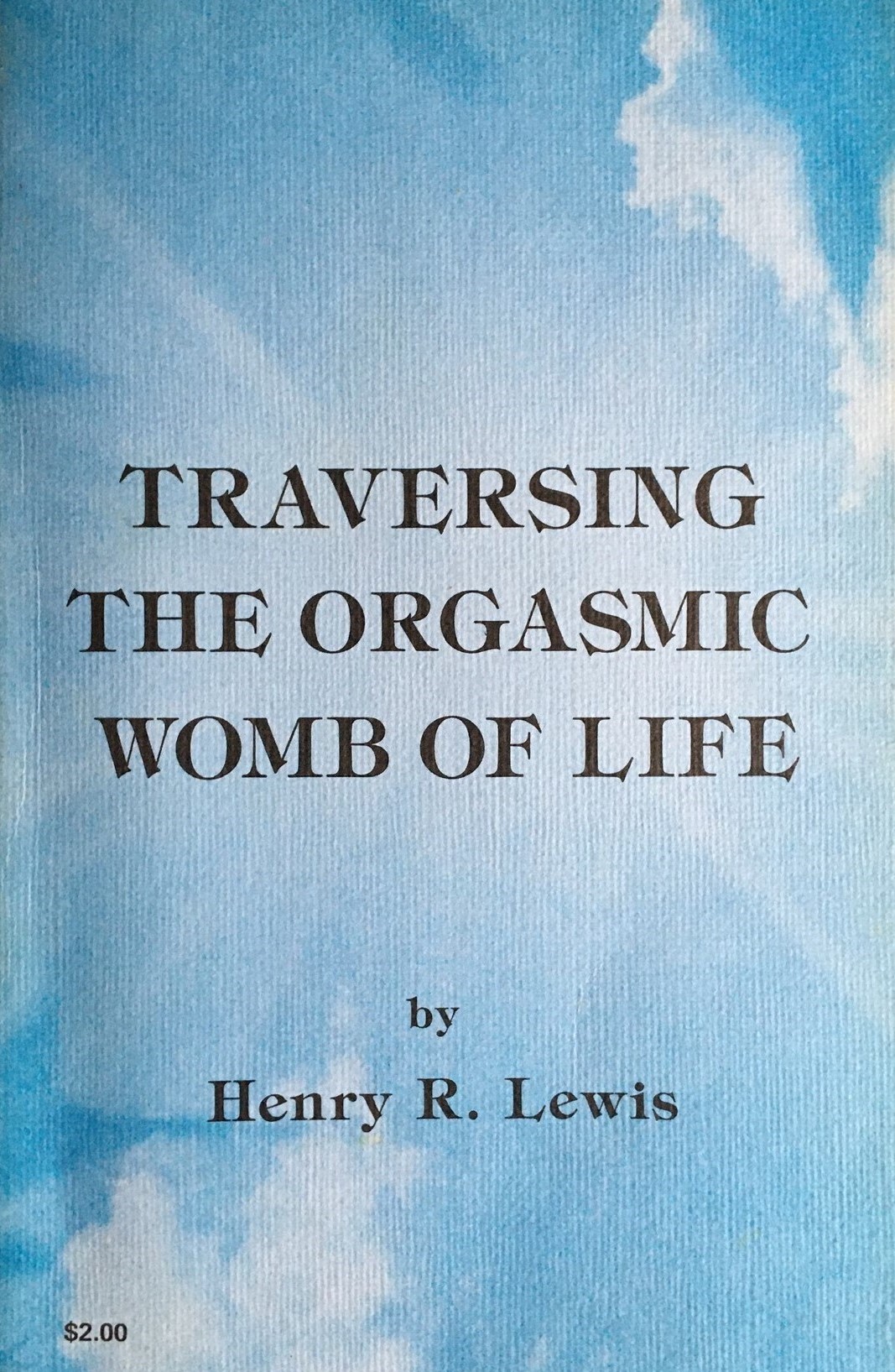
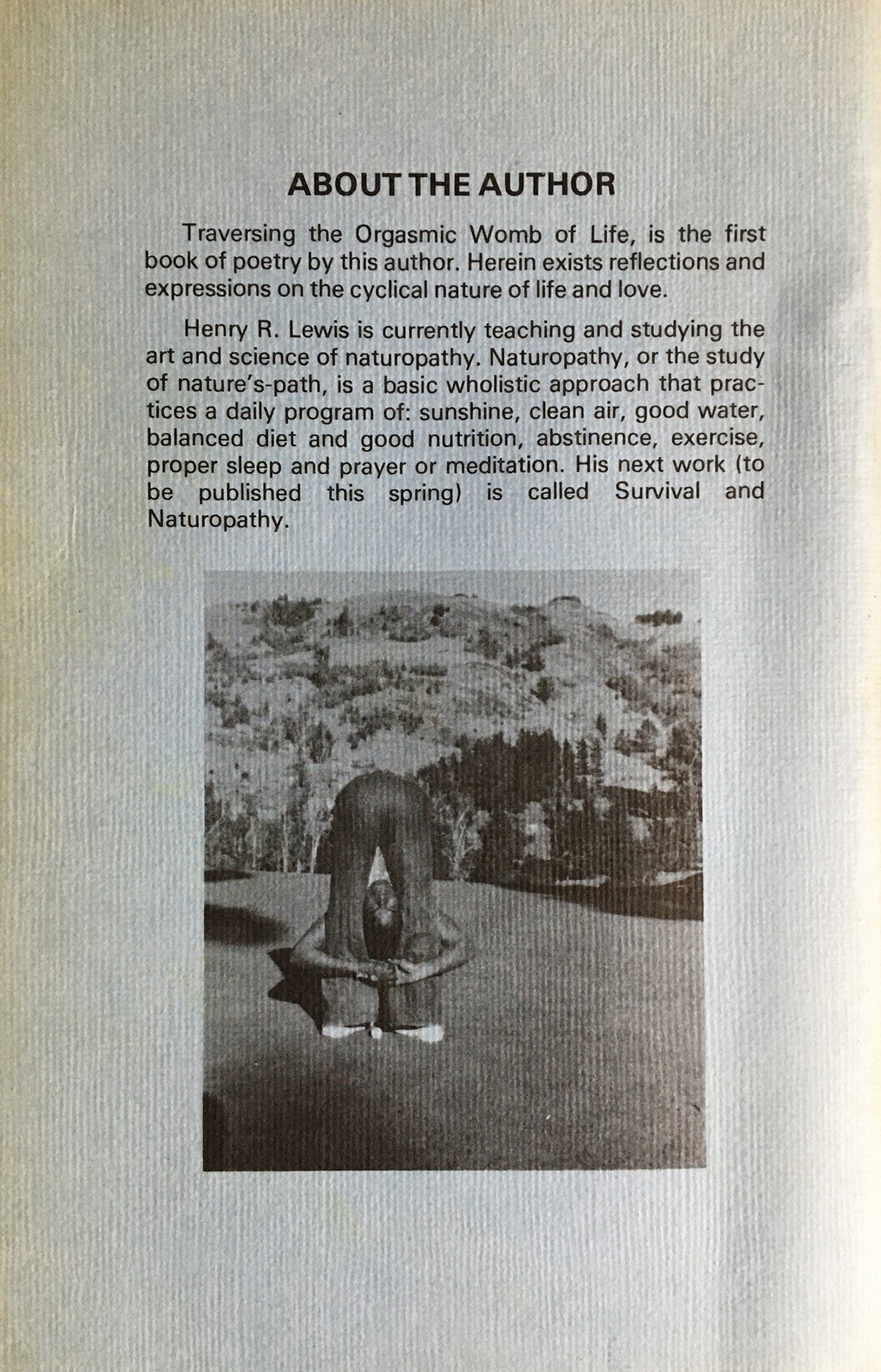
Traversing the Orgasmic Womb of Life
Harlo
Highland Park, Michigan
1978
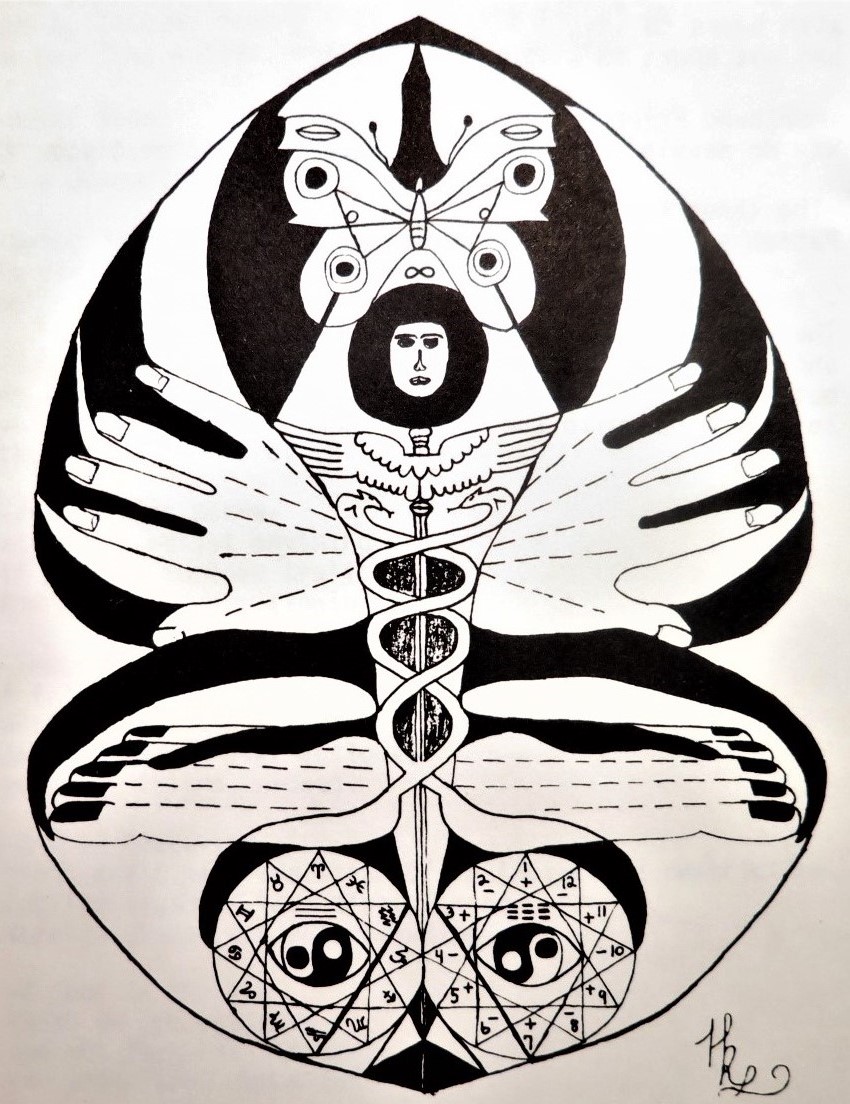
THE CIRCLE is a Henry Lewis collection from 1980, inspired by a speech at a rally for voting rights that Malcolm X gave in Harlem in 1964, along with Fannie Lou Hamer, one of the most powerful women in the civil rights movement. It was a speech where Malcolm said there was no division in the hatred coming from the crackers in the South or from the North.
So all I say is this, this is all I say: when you start talking about one, talk about the others. When you start worrying about the part or the piece, worry about the whole. And if this piece is no good, the entire pie is no good, because it all comes out of the same plate. It’s made up out of the same ingredients.
—Malcolm X, December 20, 1964, Harlem
Dedicated to “The CIRCLE of Life and Balance,” Lewis’ book is arranged like an alphabet book or primer for children. From “A to W” Lewis arranges his proverbial sayings from two to eight lines in his dictionary of definitions. Printed in 1980, THE CIRCLE was published by Lewco, perhaps his own publishing company. Here are a few Lewis definitions:
DOPE
Everyone should be dope pushers
—push the dopey to realization.
HUNGER PAINS
Few eat to live, some live to eat,
many eat to die, but most are
dying to eat.
SENSITIZED
True sight is heard and not seen,
And true hearing is seen and not heard.
WARRIORS
It is not war that makes a true warrior, but a
capacity to stand and fight for truth.
In the back of THE CIRCLE, Lewis has put together several pages of visual equations. Comparing the yearly circles of tree rings with the pupil and iris of the eye. Illustrative rib cages and ovums, galaxies and planets—spaces where Lewis sees natural universal laws at play in spirals and in mankind’s origin.
Little is known of Henry R. Lewis’s biography. He would probably be in his mid-sixties if still alive and there are at least three other self-published books outstanding. Lewis promotes wellness, vegetarianism, and a philosophy of naturopathy: “a system of alternative medicine based on the theory that diseases can be successfully treated or prevented without the use of drugs, by techniques such as control of diet, exercise, and massage.” Three volumes of Survival and Naturopathy exist, along with the The Gift of Life is Live; Edifying the Quintessence of Antaeus; and Inamoratas and Inamoratos.
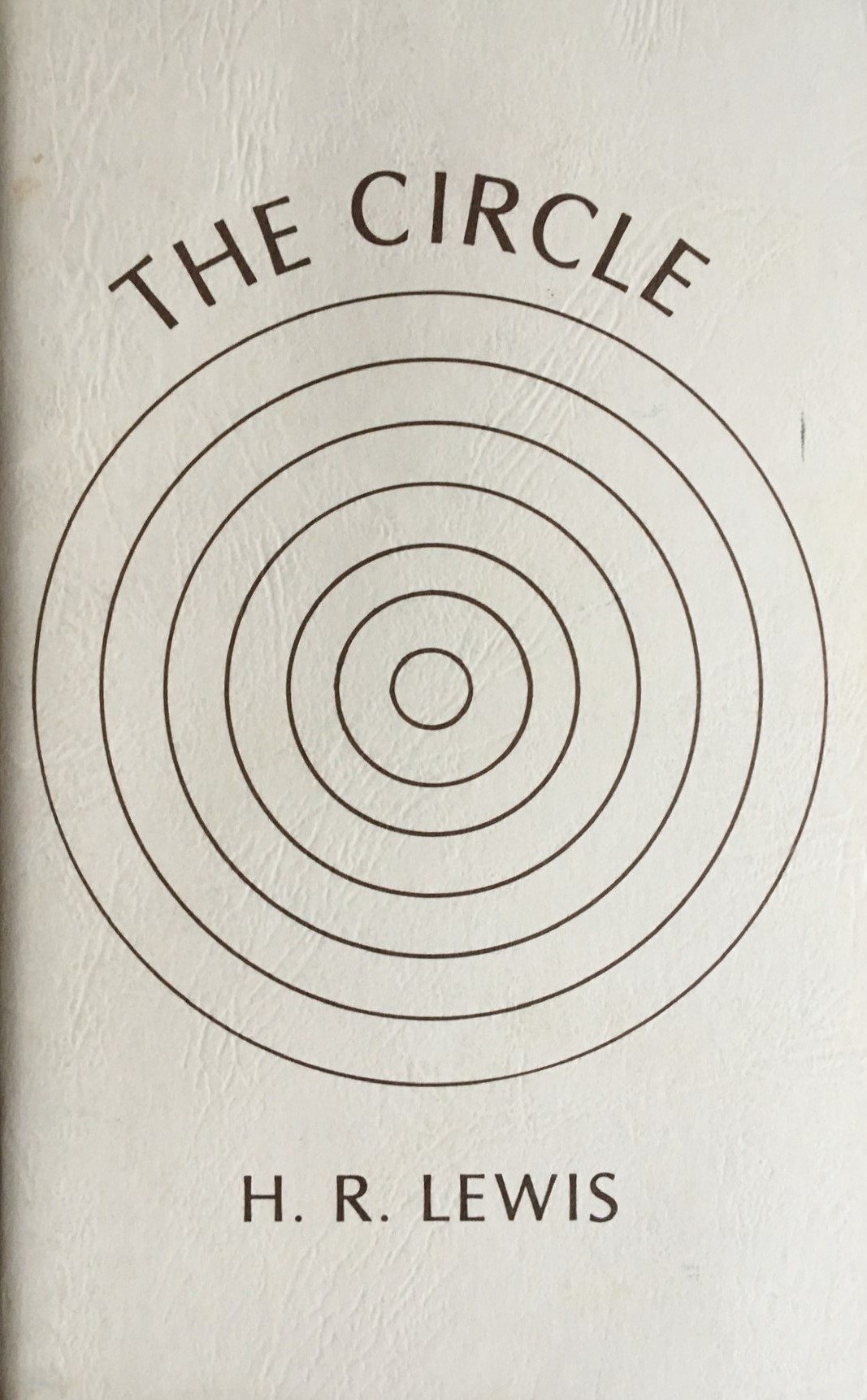
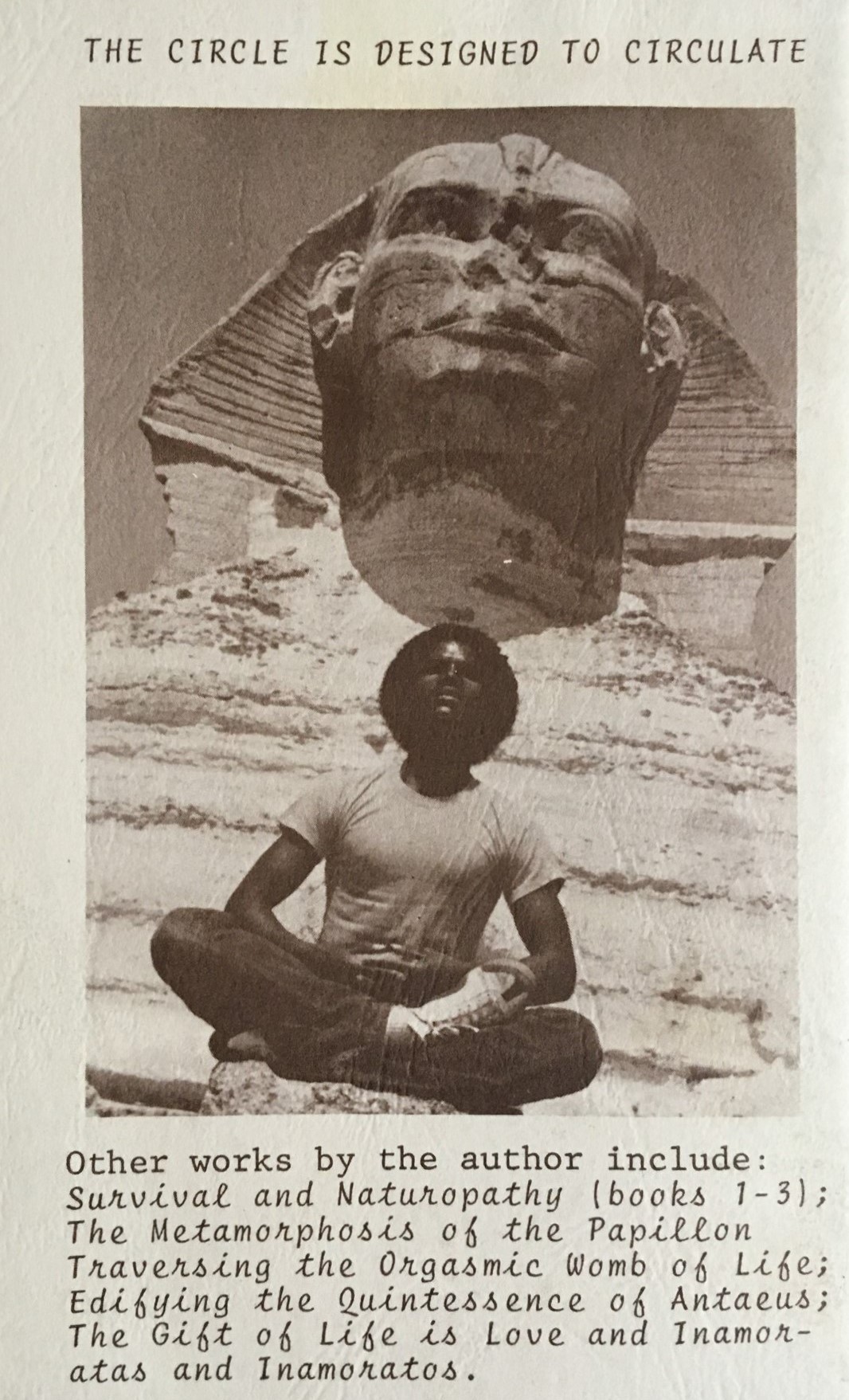
THE CIRCLE
Lewco
Detroit, Michigan
1980
Cary Loren is an artist and musician, and was a founding member of the Destroy All Monsters collective. He is co-owner of Book Beat, an independent bookstore in Oak Park, Michigan.
Read next: Malayeen, a transmission of a performance by Leyya Tawil